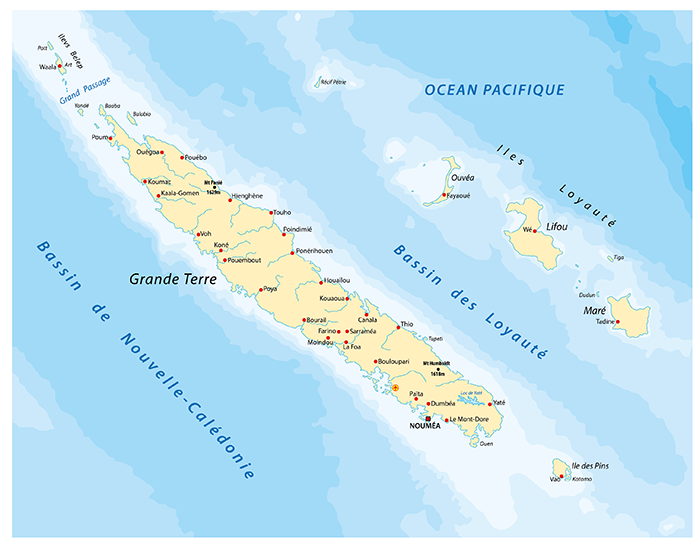Interviews / Geopolitical Observatory of the Indo-Pacific
5 November 2024
Turbulence in the French Indo-Pacific: Domestic and Foreign Policy, the Multiple Dimensions of the New Caledonia Crisis

In his policy address on October 1, 2024, the new Prime Minister Michel Barnier placed significant emphasis on New Caledonia. This territory, an undeniable showcase and testing ground for France’s Indo-Pacific strategy, has been grappling with a cycle of destructive violence since May 2024. These events have severely strained relations between communities, weakened France’s regional image, and undermined the coherence of its Indo-Pacific policy. The Prime Minister and his Minister for Overseas Territories, François-Noël Buffet, appear determined to pave the way for reconciliation and the resumption of dialogue in New Caledonia. This conciliatory approach raises hopes for an agreement on future governance and a new sovereignty arrangement for the territory. However, 26 years after the Nouméa Accords (1998), which envisioned a “common destiny,” and three referendums on independence, a shared history continues to be interpreted differently, dividing the memories of its inhabitants. The island’s future political status remains unresolved. The New Caledonian crisis has starkly exposed the gap between France’s ambitious Indo-Pacific vision and the political and historical realities on the ground. Two interconnected dimensions emerge, closely linking domestic political issues with foreign policy challenges. Without a successful resolution to the crisis, Emmanuel Macron’s efforts to legitimise France’s Indo-Pacific positioning could be seriously undermined. This weakening of France’s stance comes amid a significant diplomatic and security resurgence by the United States and its key allies (Australia, Japan) in the region, aimed at countering China’s increasingly active presence and influence. Insights from Marianne Péron-Doise, Associate Researcher at IRIS and Director of the Geopolitical Observatory of the Indo-Pacific.
How is the approach advocated by the Barnier government characterised?
The Prime Minister pledged to adopt an approach based on “listening, respect, and dialogue” and announced a major concession to the pro-independence supporters of New Caledonia. He committed not to convene the joint chambers of Parliament to finalise the controversial reform on expanding the electoral body for provincial elections. He stated that President Macron would confirm this during his meeting with New Caledonian representatives in the French Parliament in November.
While this addresses one of the key demands of pro-independence leaders, the suspension of the electoral reform has caused significant frustration among loyalist factions, including Macronist MP Nicolas Metzdorf, further perpetuating the divide between communities. Until now, President Macron had only stated that he would “suspend” the proposed legislation.
Equally important, Mr Barnier announced the beginning of a new phase of economic and social reconstruction, alongside efforts to reach a political consensus on future governance. He also revealed that local elections would be postponed until late 2025. Finally, a parliamentary mission led by the presidents of the French National Assembly and Senate is scheduled to visit New Caledonia from 9 to 14 November 2024.
What are the main challenges that François-Noël Buffet, the new Minister for Overseas Territories, will need to address?
To date, the security, social, and food situation of the 300,000 residents of New Caledonia has significantly deteriorated. A radical shift in political and humanitarian approaches is urgently needed to restore a semblance of order in the territory—a reality the Barnier government has recognised. Issues such as insecurity, a crisis of trust, economic stagnation, the radicalisation of political forces, and regional anxiety among New Caledonia’s neighbours are the primary challenges François-Noël Buffet will need to address promptly.
During the early October 2024 visit to Paris by a cross-party New Caledonian delegation seeking to highlight the urgency of reconstruction, the new Minister for Overseas Territories—who previously chaired a Senate committee on New Caledonia and is well-acquainted with the issues—outlined his approach:
- Restoring the impartiality of the French State, which he described as “the cornerstone of the Matignon and Nouméa Accords”;
- Re-establishing consensus in decision-making;
- Quickly resuming dialogue with all parties;
- Promoting a swift return to public order;
- Supporting social and economic reconstruction.
The minister’s mid-October mission to New Caledonia provided him with a clearer understanding of the efforts needed to restore the normal functioning of essential public services, including schools, hospitals, and transport. The French government plans to allocate approximately €4.5 billion over five years to restart the island’s socio-economic framework. The situation is particularly critical, as the nickel industry—considered the economic engine of the island—is nearing bankruptcy.
These proposals for New Caledonia suggest a degree of flexibility. François-Noël Buffet’s emphasis on France “restoring” its impartiality is a significant gesture, implicitly acknowledging past bias. This has been a central criticism of France’s handling of the third independence referendum in 2021 and subsequent developments, particularly from pro-independence groups. It remains to be seen whether France’s concessions will suffice to bring an end to the unrest.
What are the initial local and regional reactions to these announcements?
The announcements by the Barnier government represent significant conciliatory efforts on France’s part and hold importance not only for New Caledonia but also for its neighbours—Australia, the Melanesian countries, and the broader Pacific Islands Forum (PIF). While Michel Barnier made the key announcements, it is evident that President Macron, the persistent and committed architect of France’s Indo-Pacific strategy, is deeply involved. The Prime Minister’s prioritisation of New Caledonia, even as his government and general budget proposals face intense parliamentary scrutiny, underscores France’s determination to maintain its presence in the region and defend its sovereignty, a cornerstone of its Indo-Pacific strategy.
At the same time, possibly mindful of his government’s fragility and vulnerability to potential no-confidence motions, the Prime Minister ensured sustained institutional attention by appointing the presidents of both chambers of the French Parliament to lead a mission for consultation and dialogue. Senate President Gérard Larcher has long played a constructive role in New Caledonia. The decision to send a high-level mission co-led by Larcher and National Assembly President Yaël Braun-Pivet also signals to Pacific nations, which had proposed a PIF mediation mission in July 2024, that France is firmly in control of the situation.
Local political reactions in New Caledonia have been mixed. The multipartisan delegation that visited Paris in early October 2024 unequivocally supported Michel Barnier’s approach. However, some loyalist representatives criticised the minister, suggesting he had underestimated the gravity of the situation. Pro-independence parties, reassured by the abandonment of the electoral reform, reiterated their calls for a new self-determination vote following the third referendum, which they consider invalid, and for the release of their leaders detained in mainland France. Whether the government’s concessions will be enough to quell unrest in New Caledonia remains uncertain. The pro-independence movement is divided, and the ability of some leaders to manage the frustrations of young Kanaks is unclear.
France’s concessions have been met with relief by the Pacific “family,” particularly the PIF, the main regional organisation in Oceania, comprising 18 member states and associated territories, including New Caledonia and French Polynesia since 2016. The organisation, which has historically had a strained relationship with France, had taken the initiative to propose a mediation mission in July. However, it later shifted to a more acceptable “information” mission to assess the situation in New Caledonia, a move welcomed by the French government.
How can the challenges of “balanced information” in addressing the New Caledonia crisis be understood?
This focus on transparent information, provided with full awareness by PIF representatives and intended for Forum members and the Pacific public, highlights the battle of narratives, the information war, and potential foreign interference surrounding the New Caledonian crisis. Questions remain about the nature of support from the Azerbaijani government to the Kanak and Socialist National Liberation Front (FLNKS) through an NGO, the Baku Initiative Group, funded by President Ilham Aliyev’s regime and supportive of independence movements. France, targeted through New Caledonia and French Polynesia, is seen as being “punished” for its support of Armenia in its conflict with Azerbaijan.
In April 2024, a memorandum on cooperation between the Congress of New Caledonia and the Azerbaijani National Assembly was signed by an FLNKS representative on behalf of the Congress, which later declared it null and void. This attempt at destabilisation—likely accompanied by more subtle efforts—makes access to “balanced information“, as described by French Ambassador for the Pacific Véronique Roger-Lacan, all the more necessary. It aims to counter the distortion of narratives about the alleged disproportionate use of force by French authorities and to recalibrate the emotional responses of island nations, particularly Melanesian ones, which perceive the situation as a neocolonial attempt to strip indigenous peoples of their rights and legitimate representation.
The PIF fact-finding mission, consisting of the Prime Ministers of the Cook Islands, Tonga, and Fiji, as well as the Foreign Minister of the Solomon Islands, interviewed a wide range of New Caledonian stakeholders from October 27 to 29, 2024. But can it be considered neutral? Fiji and the Solomon Islands are part of the Melanesian Spearhead Group, created in 1988 to support New Caledonia’s independence, and the FLNKS is a member. Moreover, Fiji, the Cook Islands, and Tonga are heavily integrated into China’s Belt and Road Initiative (BRI). This Chinese economic influence also extends to New Caledonia, with Beijing importing over 50% of the territory’s nickel.
Does the New Caledonian crisis signal the decline, if not the end, of France’s Indo-Pacific ambition?
The idea that France could be considered a Pacific island nation continues to surprise many of its neighbours. While recognising its engagement with Paris, members of the Melanesian Spearhead Group still view France as a European country and a colonial power administering territories acquired in the 19th century. Indeed, France’s Indo-Pacific strategy relies on its legitimacy as a resident state and its sovereignty over New Caledonia, French Polynesia, and Wallis and Futuna. The New Caledonian issue, however, could raise broader questions. In one of his first speeches to the Pacific Islands Forum (PIF) following his election in 2021, New Caledonia’s pro-independence president, Louis Mapou, stated, “There is no doubt that France needs New Caledonia and French Polynesia to counter other powers in the region. But that is not our project—we want to integrate with our neighbours in the region.”
To date, France has sought to leverage the Nouméa Accord and the transfer of competencies to the local government while maintaining its sovereign prerogatives in defence and foreign relations. France’s claim to legitimacy in the Pacific is rooted in its possession of a vast maritime domain, making it the world’s second-largest maritime power, its capacity to monitor and protect this area, and its contributions to regional security through extensive military cooperation. France has crafted an alternative and inclusive narrative within a region polarised by Sino-American rivalry, benefiting from the diplomatic and financial capabilities of the European Union. President Macron has particularly aimed to enhance cooperation with Pacific island states, helping them protect their blue economies, combat illegal fishing, and address the impacts of climate change.
The expansion of New Caledonia’s Armed Forces (FANC), with recently increased personnel and equipment, reflects France’s commitment to multilateral diplomacy. This includes environmental security, disaster relief (HADR), and biodiversity protection, in partnership with Australia and New Zealand. The hosting of the South Pacific Defence Ministers’ Meeting (SPDMM) in Nouméa in December 2023 underscored the territory’s role in affirming France’s Indo-Pacific identity and its efforts to deepen regional security cooperation for the benefit of more vulnerable island neighbours.
France stands to lose significantly on both regional and international fronts if the New Caledonian crisis persists. Such a situation could undermine the credibility of its Indo-Pacific engagement and dangerously shift the balance of power in the region.

